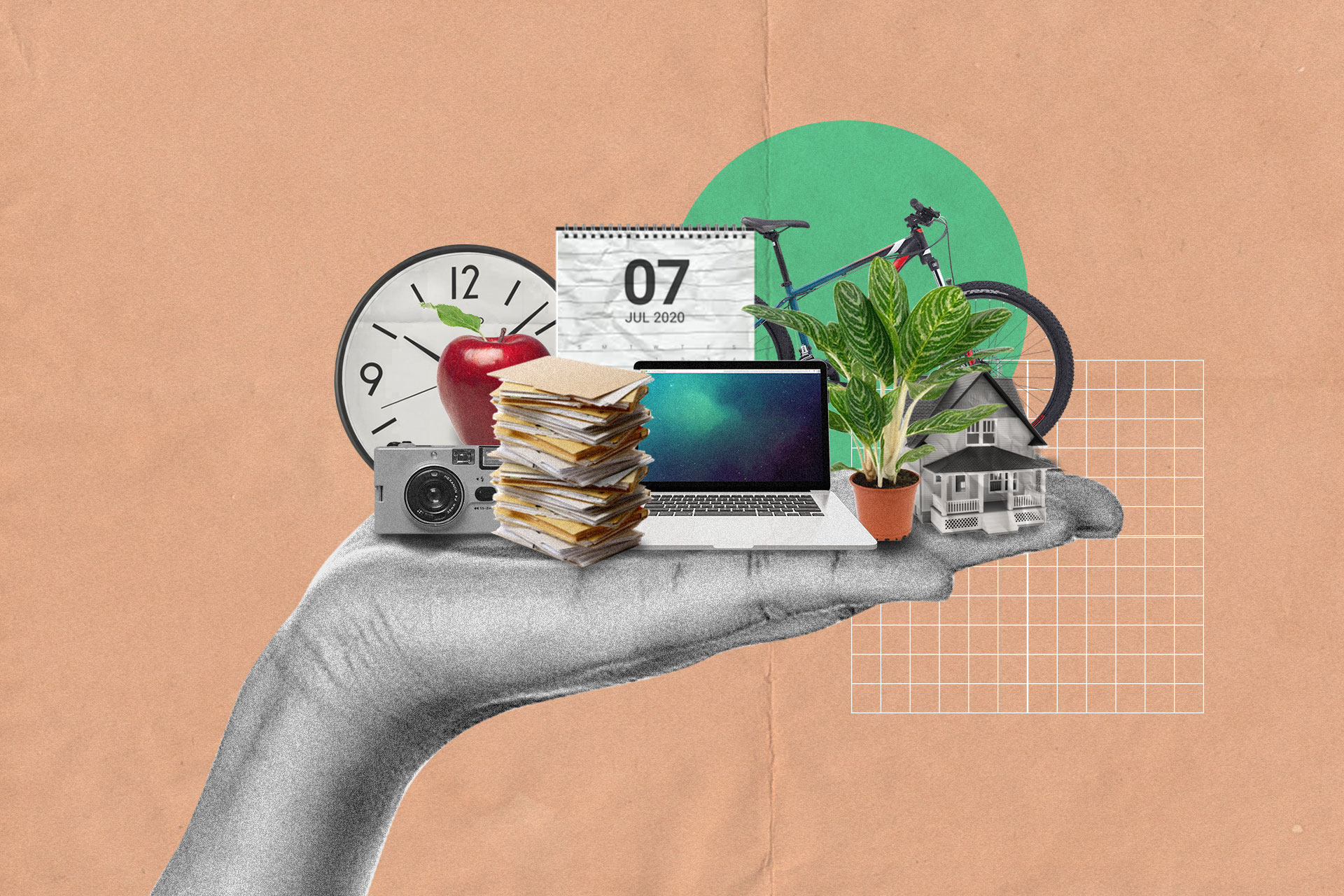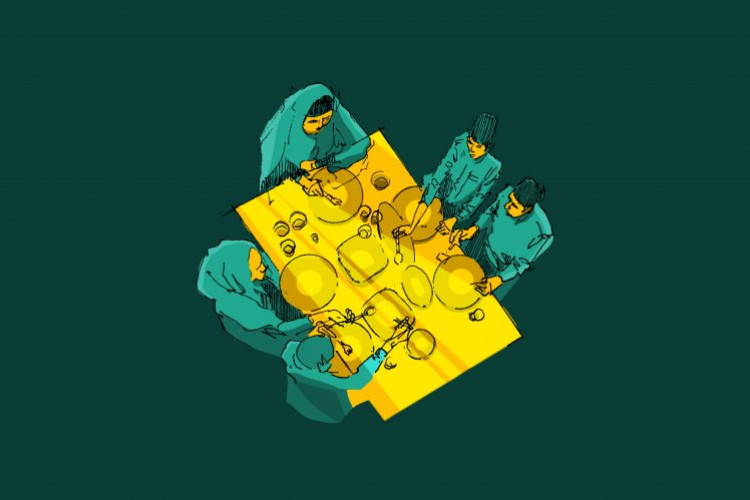
Mempertanyakan Konsep Work-Life Balance di Antara Tantangan Kehidupan Urban
Berbincang bersama Rara Sekar, hingga Hannah Al Rashid tentang konsep pola hidup seimbang di bawah tekanan gaya hidup terkini.
Words by Whiteboard Journal
Teks: Bintang Lestada
Dunia bergulir semakin cepat, kebutuhan baru datang berkali lipat. Kita dituntut untuk terus keep up, dan di antaranya, sering pola kehidupan kita jadi berantakan. Lembur jadi kosakata harian, dan istirahat jadi mitos yang hanya ada di angan-angan. Pola yang demikian membuat konsep “work-life balance” mengemuka. Metode ini memperkenalkan metode di mana kita memisahkan cara kita berfungsi di tempat kerja dan cara kita santai di rumah. Kami berbincang dengan sosok dari berbagai latar belakang untuk menguraikan tentang apa yang dimaksud dari the ever-elusiveness of ‘work-life balance’.

Rara Sekar
Musician, Freelance Researcher and Arkademy Mentor
Apa yang kamu anggap sebagai aspek paling underrated dalam mencapai work/life balance?
Sebenarnya, ada satu hal yang pernah diucapkan salah satu dosenku terkait work/life balance yang cukup mengubah cara pandangku: work/life balance itu tidak mungkin, sebab batas apa yang memisahkan antara kerja dengan kehidupan ketika kerja (dan makna yang terikat dengannya) adalah bagian dari kehidupan itu sendiri? Buatku pribadi, mungkin istilahnya bukan work-life balance ya, tapi lebih ke bagaimana aku bisa mencapai kesejahteraan, menjaga kesehatan jiwa dan raga dan menyadari batasan-batasan dalam diri. Semua ini tentunya perlu perenungan panjang yang terus berlanjut soal hal-hal fundamental yang mendorongku untuk bekerja atau memilih pekerjaan-pekerjaan atau jalan hidup tertentu: apa arti bahagia buat diriku? Apa dan siapa yang membuat hidup ini bermakna? Kehidupan seperti apa yang aku inginkan? Maka menjawab pertanyaanmu, aspek ‘remeh’ yang mungkin menjadi penting untuk menjaga kewarasan buatku adalah kemampuan dan kemauan untuk refleksi tentang diri.
Di sisi lain, untuk mencapai kehidupan yang sejahtera, aspek lain yang sangat krusial yang menentukan sejauh apa seseorang bisa memiliki waktu senggang untuk melakukan kegiatan yang tidak berkaitan dengan kerja adalah keistimewaan dan modal. Ketika seseorang, kita ibaratkan seorang ibu yang bekerja full-time di pabrik garmen, menanggung beban ekonomi untuk orang tuanya yang sudah berusia senja, ditambah harus mengurus anak dan rumah tangga sendiri, akan jauh lebih sulit untuk menikmati waktu untuk dirinya, dan hal-hal di luar kerja formal dan informal (kerja rumah tangga). Terutama jika kita bandingkan dengan seorang perempuan yang datang dari keluarga yang mapan, kerja full-time di sebuah start-up di ibukota, hidup tanpa atau sedikit tanggungan, pun jika sudah punya anak ia mampu membayar baby sitter untuk membantu menjaga anaknya ketika ia ingin pergi nonton konser bersama suaminya di akhir pekan. Singkatnya, persoalan “work-life balance” adalah persoalan kelas juga.
Pernahkah kamu merasa gak enak karena kangen sama kehidupan personal pas lagi kerja, dan kangen kerjaan ketika lagi enjoying your life?
Merujuk pada jawaban di atas, kerja buatku adalah bagian dari hidup ya, meskipun ia tergolong sisi kehidupan yang melelahkan. Jadi agak janggal merindukan kehidupan ketika sedang menjalani hidup itu sendiri. Mungkin salah satu hal yang sering membuatku sedih ketika sedang bekerja (terutama bepergian dan untuk waktu yang lama) adalah perasaan jauh dari rumah dan keluarga. Kalau merindukan kerja formal (seperti di kantor gitu?) kayaknya belum pernah ya? Kalau bisa ga kerja, kenapa harus kerja? Hahaha. Kalau boleh, aku lebih memilih di rumah, berkebun, baca buku, masak-masak, bermusik di kamar atau naik sepeda. Sayangnya kegiatan-kegiatan seperti itu tidak menghasilkan uang untuk saat ini jadi tetap harus bekerja.
Apa aktifitas keseharian biasa kamu kalau di kantor?
Sebagai pekerja lepas, tidak ada hari kerja yang tipikal buatku. Kalau sedang aktif bermusik, maka skenario yang bisa dibayangkan adalah: latihan, gladi resik/sound check, manggung, foto-foto, beres-beres alat, lalu pulang. Kalau sedang kerja penelitian, maka kerja adalah lebih banyak membaca, menulis, sesekali keluar kota untuk mewawancarai narasumber, lalu presentasi hasil penelitian di depan donor/organisasi tertentu. Jika sedang aktif mengajar fotografi kritis atau riset untuk fotografi di kolektif Arkademy, maka ‘kerja’ adalah mengajar kelas di rangkaian lokakarya, me-review hasil cerita foto, berdiskusi dengan peserta, dan mempresentasikan karya foto hasil lokakarya. Tidak ada rutinitas saat ini dalam hidupku dan untuk saat ini aku rasa ini konfigurasi yang paling tepat buatku pribadi.
Gimana sih kamu bersantai dari hari yang sibuk di tempat kerja?
Karena aku bekerja project-based, jadi terkadang rentang waktunya bukan ‘busy day’ tapi ‘busy months’. Setelah proyek selesai, biasanya aku dan Ben akan menarik diri dari kehidupan sosial, lebih aktif di kebun, lebih aktif naik sepeda, lebih banyak masak di rumah, dengerin album-album musik yang baru rilis dari awal sampai akhir, dan pastinya kalau sangat sangat lelah aku pasti akan pijat dan akupuntur untuk relaksasi lebih dalam.
Di masa depan nanti, apakah kamu percaya bahwa ‘fleksibilitas’ pada akhirnya akan mengarah ke lingkungan kerja terbaik bagi kita semua?
Kebetulan aku anggota SINDIKASI (Serikat Pekerja Media dan Industri Kreatif untuk Demokrasi), dan di serikat diskusi tentang fleksibilitas pekerja memang sedang hangat diperbincangkan. Fleksibilitas memang digadang memberikan pekerja lebih banyak kebebasan untuk menentukan waktu dan tempatnya bekerja. Akan tetapi, fleksibilitas tak serta merta membuat pekerja lepas terbebas dari kerentanan dan permasalahan ketenagakerjaan lainnya. Kekosongan payung hukum untuk melindungi pekerja lepas justru bisa memberi ruang eksploitasi baru untuk pekerja ekonomi digital — tidak ada perlindungan atau jaminan kesehatan dan keselamatan untuk pekerja, tidak ada batasan jam kerja, tidak ada kontrak kerja, tidak mengindahkan hak-hak pekerja, dst dst. Aku pribadi pernah dirugikan oleh narasi fleksibilitas (dan atas nama pertemanan) dan akhirnya bekerja tanpa upah sebab kontrak kerja tidak kunjung ada. Agar ke depannya kita lebih berhati-hati dengan narasi fleksibilitas yang memungkinkan bentuk-bentuk eksploitasi baru untuk pekerja lepas, Pedoman Kontrak Kerja untuk Freelancer yang baru dirilis SINDIKASI tahun ini menurutku sangat membantu dan harus jadi pegangan semua pekerja lepas yang jumlahnya semakin banyak di Indonesia belakangan ini.

Bobby Rizal
Head of Content Operations – Bytedance
Apa yang kamu anggap sebagai aspek paling underrated dalam mencapai work/life balance?
The most underrated part dari itu sih lebih ke [mencapai] ketenangan sih. Karena kita sibuk kerja, hidup jadi gak seperti lari sprint tapi lebih seperti marathon. Kita cuma harus atur pace dari larinya dengan tenaga yang ada. Beberapa orang yang ambisius dengan karir pun kadang suka lupa untuk menyeimbangkan semuanya — sampai kadang fisik dan mental kita jadi korbannya.
Pernahkah kamu merasa gak enak karena kangen sama kehidupan personal pas lagi kerja, dan kangen kerjaan ketika lagi enjoying your life?
Not at all. I guess it depends on the job, sih? Kalau kerjaannya sudah serving the purpose yang kita mau, then you’re not missing life. Selain itu juga, social life kita pun juga bisa didapatkan di ruang lingkup kantor. Dan juga, punya relasi yang baik dengan kolega tuh bisa membantu banget, jadi gak semata-mata profesional aja hubungannya.
Apa aktifitas keseharian biasa kamu kalau di kantor?
Biasanya sih di kantor menjalankan to-do list yang ada setiap hari aja. Karena kami kerjanya menggunakan OKR (Objective and Key Results), jadi kami bisa ngatur semuanya dari awal dikasih target. Dari situ ya, bisa ngatur ruang juga untuk bersosialisasi dengan kolega.
Gimana sih kamu bersantai dari hari yang sibuk di tempat kerja?
The thing is, busyness is something that has been given in life. Kalau kita gak bisa mengatur waktu dengan baik dan tidak bisa membagi pikiran dan tenaga, gimana? Untungnya sih dengan sistem OKR tadi, itu ngebantu gue banget untuk gue kerja dengan pace yang gue inginkan. Jadi gak ada hari-hari yang terlalu ‘sibuk’ aja.
Di masa depan nanti, apakah kamu percaya bahwa ‘fleksibilitas’ pada akhirnya akan mengarah ke lingkungan kerja terbaik bagi kita semua?
Setuju banget! Karena dengan fleksibilitas, kita bisa menjalankan hari dengan baik tanpa terpecah-pecah pikirannya karena dikejar daily target yang unreasonable untuk diselesaikan.

Hannah Al-Rashid
Aktor, “The Night Comes For Us” & “Aruna dan Lidahnya”
Apa yang kamu anggap sebagai aspek paling underrated dalam mencapai work/life balance?
I think the underrated aspect part is linked to gender, sih sebenarnya. In the sense that I think we greatly underestimate the pressure that is put on women particularly in achieving work and life balance. Kenapa aku bilang itu underrated adalah karena that same pressure is not put on men. Makanya, sebagai perempuan Indonesia, mendapatkan keseimbangan itu tapi juga subjected to the societal pressure and guilt tentang pilihan yang perempuan lakukan di dalam hidup kami, itu sebenarnya mempengaruhi kami juga. If we choose our careers over staying at home and vice versa, we’re stigmatized either way. Memang susah untuk mendapatkan work-life balance itu and I think it clearly shows the difference in how we treat both genders. Karena I don’t believe that men will be given that same pressure.
Pernahkah kamu merasa gak enak karena kangen sama kehidupan personal pas lagi kerja, dan kangen kerjaan ketika lagi enjoying your life?
Yeah, I have totally felt bad about missing life when I’m working. Karena nature of my job, because it’s freelance, it means that work is either extremely intense or it’s nonexistent. And when it’s really intense, it means that I miss out on a lot of things. Simple comfort, even if it just means hanging out with friends, or watching movies that I genuinely like. But equally, I think the nature of freelance is that when you’re not working, you’re missing out on a lot greatly. Living doesn’t necessarily mean that it’s something that you want to do, in the sense that if there’s no jobs, you’re forced to live. I think sometimes that’s something that I really still struggle with. That kind of freelance life and having either tons of jobs come at once or nothing at all. Both scenarios have made me feel bad.
Apa aktifitas keseharian biasa kamu kalau di kantor?
It depends on the project that I’m doing and what phase of the project I am on. If I’m on the film production, the typical day would be shooting and prepping. But when the promo time comes, the typical day would be doing media visits, cinema visits, and constantly being on social media to promote the film as well. In times of arranging jobs, then it would be a lot of meetings, making connections, and networking, with people that could be a potential client.
Gimana sih kamu bersantai dari hari yang sibuk di tempat kerja?
Again, I think it depends on what kind of work I’ve been doing. But if it’s a shoot, then, the most important thing for me is to sleep and to recuperate. Also eating good or come home straight away, shall I get ready and prep for the next day — and then sleep. But if it’s a promo tour, then I actually really like to just come home and sit on my couch and watch all kind of comfort shows on Netflix and Youtube or whatever.
Di masa depan nanti, apakah kamu percaya bahwa ‘fleksibilitas’ pada akhirnya akan mengarah ke lingkungan kerja terbaik bagi kita semua?
In future, do I believe it? Not sure, actually. Because I think flexibility and certain respects helps greatly especially with women. But if you’re a mother or wife and you have that kind of societal pressure to stay at home and look after your family and stuff, flexibility will lead to — a lot of women will be able to get help and release some of that societal guilt that we have. But at the same time… Yeah, I don’t know if flexibility always leads to the best working environment because if it gets too comfortable, will we become lax? Will we actually perform despite flexibility to the best of our ability? I wouldn’t be too sure about it. All I know is right now, being freelance offers some sense of flexibility, but when the jobs are not coming, then it also drives me crazy. But also, when things were also too flexible, if for example, you’re on standby, that’s also something that I don’t necessarily enjoy. I would rather prefer my hours to be concrete so that I can plan my day around them. What I would say is, this idea is definitely is great, particularly for working mothers or fathers — because then, they would actually find that balance for their family much more easily.

Kevin Wiyarnanda
Public Relations at Ismaya Live
Apa yang kamu anggap sebagai aspek paling underrated dalam mencapai work/life balance?
I think the most underrated aspect is that you want more hours in a day, no matter what. Because most of the times, you’d feel like 24 hours is just not enough. I don’t think you could ever be balance in everything, you know? Especially when it comes to this. With work, there are so many aspects that make up work and life simultaneously; your family, your friends, your partners and so many other things. So the fact that the desire to have more hours and the fact that you can never be balanced or equal are for me, the most underrated aspects of trying to achieve that work-life balance.
Pernahkah kamu merasa gak enak karena kangen sama kehidupan personal pas lagi kerja, dan kangen kerjaan ketika lagi enjoying your life?
I have, I don’t think anyone has ever not felt bad for missing life when they’re working, especially when you’re living in this Instagram-driven society where people tend to post things about their vacations, amazing places to go. So I think there were times where I felt bad about missing life when I’m all stressed out at work. I think that’s normal for us to have that tendency. Anything other than being stressed out would be amazing, right? So, yes. But I tend to always have my own kind of payback where everytime when I’m free from work, like having drinks on weekends or doing the things that I didn’t get to do when I was stuck at work during the weekdays. It’s a give and take situation and it’s pretty normal to feel as if they’re missing life when they’re at work. Again, because we are so driven with and by social media. But, have I ever felt bad for missing work? Yeah, for all the wrong reasons obviously. Because who wants to be disturbed by anything related to work when you’re on a holiday, having a good time?! Especially when you go far far away from hometown and/or the city that you’re based in and you spent some good money for that deserved time!
Apa aktifitas keseharian biasa kamu kalau di kantor?
So I would usually have breakfast at this cafe in my office while reading the newspapers. Going back to my desk, I would refill my water bottle that I always keep on my desk in order to stay hydrated and open my email inbox to check out if there’s any emails. Because when in contact with the artists and/or their representatives around the world, they are on another time differences. The management, the agency, and all of that. After that, I would open my Whatsapp and check out the last conversations I have with some of the PR people or the marketing communication people of different medias; making sure that the timeline that we have planned are in line and on track. Other than the fact that I’m handling PR and media relations, I also manage the PR and media relations for the record label that my company has. So, I have to reconfirm the media appearances slot for the artists that we manage and send invites to the person in charge for the media, as well as the management team. So everybody would be updated on what’s happening at that very moment. Usually when we have major announcements, I would draft press releases and prepare the email blast to journalists that are within my media database. That’s pretty much my day to day activities at work aside from meetings, whether it’s internal meetings or with the media people at the office itself or even meetings outside. It gets more exciting if you get to have meetings outside of the office, because you get to travel and meet people in real life. It makes me feel good to just go out and get my ass off of my desk and be with people. It gets me going. It’s that, and playing Dance Dance Revolution at this mall connected to my office building.
Gimana sih kamu bersantai dari hari yang sibuk di tempat kerja?
As I was saying, if it’s during office work, I would go down and play Dance Dance Revolution all alone. Because it’s so much fun and it’s like a little bit cardio. That’s pretty much what I do, to be honest. After work, however — I would go watch a movie at the cinema or just go home and watch a movie or two there, or meet up with my friends. Or even just have a really good meal for myself. Sometimes I would just decide to go have super good meal in exchange for the hard work that I’ve done for the whole day. But that doesn’t happen very often because if that does, I don’t think I can save up, you know, money. But yeah, good meals and good times with people that I love, and perhaps a little bit of me time at home, write some music and sing my ass off in the bathroom. Or even just enjoy commuting from work to home while listening to some music or finishing reading the rest of the newspapers that I didn’t get to read fully that morning.
Di masa depan nanti, apakah kamu percaya bahwa ‘fleksibilitas’ pada akhirnya akan mengarah ke lingkungan kerja terbaik bagi kita semua?
It depends on the industry or field that you’re in, though. Because there are occupations that are strict when it comes to the arrival to the workplace or the exact dress code that you have to fit yourself into for work. When it comes to flexibility in terms of appearances, sure, it can work. When it’s in terms of time, it depends on the company that you’re working for as well. In my office, we work from 10 am to 7 pm which I think it’s fair, because you get to skip the rush hours of Jakarta. As long as work does not interfere with your own personal time, it can ultimately lead to the best working environment for us all. But I think if that means when you’re out on a holiday out of the country to go on vacations and suddenly work expects you to be present — I don’t think that would be beneficial for employees. As long as it’s outside of work, that could work.











